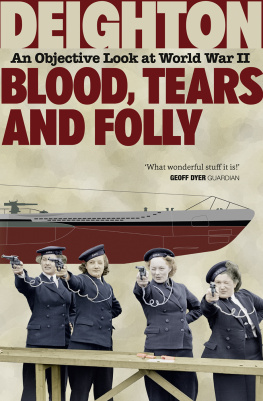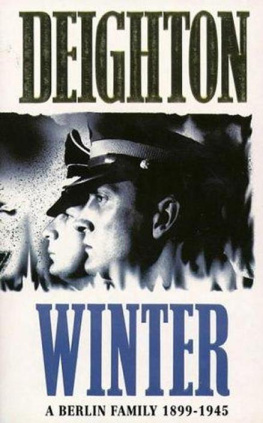Len Deighton - Only When I Larf
Here you can read online Len Deighton - Only When I Larf full text of the book (entire story) in english for free. Download pdf and epub, get meaning, cover and reviews about this ebook. year: 1991, publisher: Time Warner Paperbacks, genre: Detective and thriller. Description of the work, (preface) as well as reviews are available. Best literature library LitArk.com created for fans of good reading and offers a wide selection of genres:
Romance novel
Science fiction
Adventure
Detective
Science
History
Home and family
Prose
Art
Politics
Computer
Non-fiction
Religion
Business
Children
Humor
Choose a favorite category and find really read worthwhile books. Enjoy immersion in the world of imagination, feel the emotions of the characters or learn something new for yourself, make an fascinating discovery.
- Book:Only When I Larf
- Author:
- Publisher:Time Warner Paperbacks
- Genre:
- Year:1991
- Rating:3 / 5
- Favourites:Add to favourites
- Your mark:
- 60
- 1
- 2
- 3
- 4
- 5
Only When I Larf: summary, description and annotation
We offer to read an annotation, description, summary or preface (depends on what the author of the book "Only When I Larf" wrote himself). If you haven't found the necessary information about the book — write in the comments, we will try to find it.
Only When I Larf — read online for free the complete book (whole text) full work
Below is the text of the book, divided by pages. System saving the place of the last page read, allows you to conveniently read the book "Only When I Larf" online for free, without having to search again every time where you left off. Put a bookmark, and you can go to the page where you finished reading at any time.
Font size:
Interval:
Bookmark:
Only When I Larf
LEN DEIGHTON
First published in 1968
In 1925 a Czech nobleman writing on Ministfere des Postes et Telegraphes notepaper invited bids from scrap metal merchants for 7000 tons of metal otherwise known as the Eiffel Tower. So successful was he that, having left Paris hurriedly, he returned one month later and sold it again.
As recently as 1966 the Colosseum changed hands. A West German leased it for 10 years at 20,000,000 lire per year (cash in advance) to an American tourist who wanted to adapt the top of it for a restaurant.
In 1949 a South African company purchased an airfield in England for 250,000 pounds sterling, giving a 10% deposit to a man in the uniform of an RAF Group Captain. In 1962 a Pole in Naples collected 90,000 dollars in deposits on U.S. Navy ships. In 1963 an Irishman from Kerry sold a Scandinavian fishing fleet to a consortium of English businessmen after flying them to Bergen to view the fleet at anchor.
In 1965 two English airline stewards took a 20,000 dollar deposit on a used Boeing airliner during a three day stop over in Tokyo.
To these men on land sea and air, this book is respectfully dedicated.
We'd been eight and a half minutes earlier on the dress rehearsal. This time we were held up in a traffic jam at Lexington and Fiftieth Street. Midtown Manhattan on Friday afternoon is no place for tight schedules. I paid the cab driver with a couple of dollar bills, took fifty cents as change and gave him a two bit tip. Silas and Liz tumbled out and I heard Liz swearing softly and dabbing a spittle wet finger at the knee of her nylons.
Silas waited for no one; umbrella in one hand, travel bag in the other, he marched off into the shiny hall of the Continuum building. Liz, looking equally elegant, hurried after him. I scribbled $1.75 into my accounts notebook, stuffed it into my pocket and hurried after them. New York streets like a fairground; flashing lights, car horns, police whistles and all those organisation men with soft white shirts and hard pink faces hurrying so fast to nowhere that their grey flannel suits are going at the knees. It was late afternoon and there wasn't much action in the Continuum Building. The hall was shiny, and silent except for the tap of our shoes. On the left side of the foyer there was the Continuum Building Coffee and Do-nut shop, and a newspaper and tobacco kiosk. Neither seemed to be doing much business. The right of the lobby was a side entrance to the bank. That wasn't doing much business either, but we planned to do something about that.
I was wearing overalls and I put down the heavy bags for a moment while I unlocked the glass case, removed the 'For Rent' sign and clipped the white letters into place: '29th Floor. Amalgamated Minerals.' Pop. I closed the case and looked around but no one seemed to care. I followed the others into the lift and Mick pressed the button for the twenty-ninth. Liz snatched a look at her ladder and Silas sniffed his carnation. Vroom went the lift.
'It'll be the twenty-ninth again,' said Mick.
'That's it,' I said, picking up his brogue without meaning to.
'You'll be seeing the big fight.'
'I will,' I said.
'That feller will never learn,' said Mick, shaking his head. Silas stared at me reprovingly.
'Have you had any more trouble from the O'Reilly twins?' I asked Mick.
'Not even a visit from the big feller,' said Mick. 'I knew me cousin Pat could fix the whole matter in a jiffy, but I didn't like to worry him with little domestic squabbles.' Silas looked at us both, then asked Mick, 'What action did your cousin Pat take?'
Mick looked at Silas suspiciously. It was the hard British accent that did it. The lift stopped. Mick leaned forward to Silas and lowered his voice, 'Bless you sir, he broke their legs.' He waited a moment before pushing the button. The doors opened with a burr. 'Their back legs,' added Mick. We got out. From my heavy bag I produced a card sign that said, 'Amalgamated Minerals Reception.' I hung it by the lift. As we walked along the corridor Silas switched on all die lights.
'Who the hell's that?' said Silas. He shivered.
'Mick, the liftman,'
'How do you know all about his friends and family?'
I said. 'I heard someone talking to him one day. So now I always say, "Had any more trouble from the O'Reilly twins Mick?" or "How are the O'Reilly twins," or....' Silas grunted. As he walked along the corridor he closed the doors of the empty offices. Bonk, bonk, bonk.
I followed Silas and Liz into the offices the janitor had furnished for us. From behind the door's glass panel a voice said, 'I'm just about done.' The last of the putty fell onto a sheet of newspaper and the glass panel bearing the battered old words 'General Manager's Office' lowered gently to reveal ihe ugly face of the janitor. 'I've got rid of the cleaners and I've furnished both offices with the furniture you chose. It was heavy....'
Almost without pausing in his stride, Silas placed a hundred dollars in tens between the man's teeth. That smile could have held another five grand.
Silas and Liz marched into the inner office. The janitor raised the new glass panel into place. On it was expensive gold-leaf lettering that read 'Amalgamated Minerals Inc. New York. Washington. Seattle. London. Stockholm. Office of Sir Stephen Latimer. President.'
You know how these New York executives start off in a bull pen. Then they get themselves promoted to a room without windows, window facing an air shaft and, if they really make the top, get an office with an outside view. This one was on a corner of the building: three windows. The janitor must have really raided the building; a fitted carpet, Knoll desk, squawk box, four phones. Mies van der Rohe chairs, and a tall Hepplewhite bookcase full of National Geographies. I went to the window; it had a view like an airline poster. On the roof of the Pan Am building a helicopter was warming up before flying to Kennedy Airport: Pockety, pockety, pockety. Clear blue air, skyscrapers and far below brightly coloured cars pulling into the kerb as fire engines wailed their way to Wall Street.
Silas coughed to attract my attention. Then he gave his roll brim hat, and umbrella to Liz as though he'd been arriving here to start work all his life. I had no overcoat, I took off my overalls. Silas got behind the teak desk and got the feel of the controls. Liz had got an electric drill out of the bag and plugged it into the wall socket. As I turned she gave it a test buzz and handed it to me. I began to drill holes through the thin partition wall. We had done it both ways on rehearsals. We'd taken sample hardboard and tested for the joists. We had used a mechanical saw and various drills. Twenty two holes with a three-quarter inch drill finishing with the saw had proved the quickest. Silas never begrudged money for research, it was an obsession with him.
Liz took framed photos from the bag and began to arrange them on the walL They were all air photos of mine-heads or plant. Beautifully printed under each photo on the thick mounts it said things like 'Borke Sweden. Plant for Ore Processes. Amalgamated Mineral Svenska AB. Second Largest in Scandinavia.5 Or it said, 'Mining Drill Manf. Co., Illinois, owned by Amalgamated Mineral Inc. New York.' Silas had researched each caption and the frames were light teak so that they would match the desk.
By the time I'd finished drilling and had broken a circular hole in the partition, Silas had arranged his personal photos on his desk. Photos of wife and families in front of a large country house, all featured a dopey man with a big moustache that Silas claimed was him a few years back. He helped me to fit the old fashioned wall-safe into the hole I'd made. I'd done it just right, so we didn't need any of the wooden wedges to hold it firmly into the partition wall. Silas fiddled with the combination, and opened and closed the safe door a few times. Zonk. It closed with a clang. Yeah, very convincing. After all, it was a real safe except that there was no back to it. Apart from a piece of black velvet to keep it dark, it was just a tube into the room next door.
Next pageFont size:
Interval:
Bookmark:
Similar books «Only When I Larf»
Look at similar books to Only When I Larf. We have selected literature similar in name and meaning in the hope of providing readers with more options to find new, interesting, not yet read works.
Discussion, reviews of the book Only When I Larf and just readers' own opinions. Leave your comments, write what you think about the work, its meaning or the main characters. Specify what exactly you liked and what you didn't like, and why you think so.








